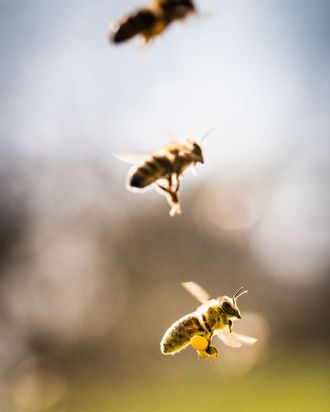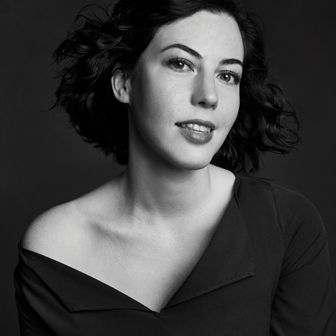
If there’s one thing you should know about me, it’s that I’m incredibly afraid of pain — and thereby terrified of getting stung by a bug of any kind. So if I notice there’s a bee nearby, I’m immediately bolting down the street to get as far away from it as possible (while also respecting its right to exist, of course, as I know certain bees are endangered). That fear is basically all I know about bees, but lately I’ve noticed that just about everywhere I look, someone in the wellness industry is going on and on about the supposed benefits of bees, and telling me to add bee pollen to my diet. So I consulted with a couple of experts to get the lowdown.
What is bee pollen? Registered dietitian Amy Shapiro, of Real Nutrition NYC, explained to me that bee pollen is basically the food of young bees. They make it when they land on the flower by bringing honey from the hive, scraping off the pollen (which is the male seed of a flower), and using their legs to create a pollen granular. Shapiro noted that it’s crunchy like a chia seed, so some people like to add a spoonful of it to their oatmeal, yogurt, and smoothies, while other people take it as a supplement or capsule.
But what are people saying it does? Canadian scientist Timothy Caulfield, a professor of health law and policy at the University of Alberta and the author of Is Gwyneth Paltrow Wrong About Everything?: When Celebrity Culture and Science Clash, told me that bee pollen is “one of those products that is almost given kind of magical qualities.” By that he means, people claim bee pollen can boost your health, that it has anti-aging effects, that it helps wounds heal, and that it can help detoxify the body.
So, does bee pollen actually have any health benefits? From speaking with the two experts, it seems like the health community is split on the topic of bee pollen. On the one hand, Caulfield told me that, no, bee pollen hasn’t been proven to do much. “In general, it is largely evidence-free. There aren’t any good clinical trials that show it’s beneficial for really anything,” he said. Furthermore, a 2012 article in Science-Based Medicine noted that the claims around bee pollen are “full of hype but are completely unsubstantiated by rigorous scientific evidence.”
But on the other hand, Shapiro told me that bee pollen does have some nutritional properties. She said that it’s 40 percent protein, and that it has a bunch of B vitamins and folic acid. Also, that same 2012 article acknowledged that a small study found it did have some anti-inflammatory properties. “There is no doubt that bee pollen contains many biologically active chemicals, and it is not implausible that one or more of these chemicals might have a medically useful property,” Dr. Steven Novella, of Yale University School of Medicine, wrote in the article. “It’s just as plausible, and a-priori more likely, that they will have properties that have negative health effects.”
Okay, but what does that mean? So basically, Caulfield says there isn’t enough evidence to consider bee pollen to be some magical healing elixir, but if you like the taste of it, sure — keep using it. “I wouldn’t go out of my way to eat bee pollen because of its nutritional qualities,” Caulfield said. “If you enjoy the bee pollen, if you enjoy the taste of it, go for it.”
Who shouldn’t use bee pollen? Well, first off, if you have an allergy to bees, you shouldn’t be using bee pollen. People with bee allergies can go into anaphylactic shock from ingesting bee pollen, Caulfield warned, and such a side effect has been seen in people who didn’t have any prior bad experience with bees. The way to figure out if you’re allergic to bee pollen is to check with a doctor and get tested, the scientist noted. Pregnant and breastfeeding women should also steer clear of it. Furthermore, Shapiro added that vegans will likely want to stay away from bee pollen as well. PETA notes on its website that vegans can use bee-free products, instead of turning to honey, bee pollen, or royal jelly.


